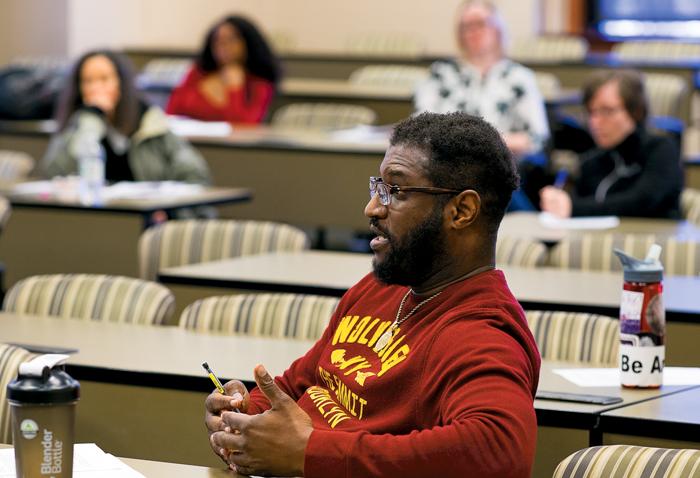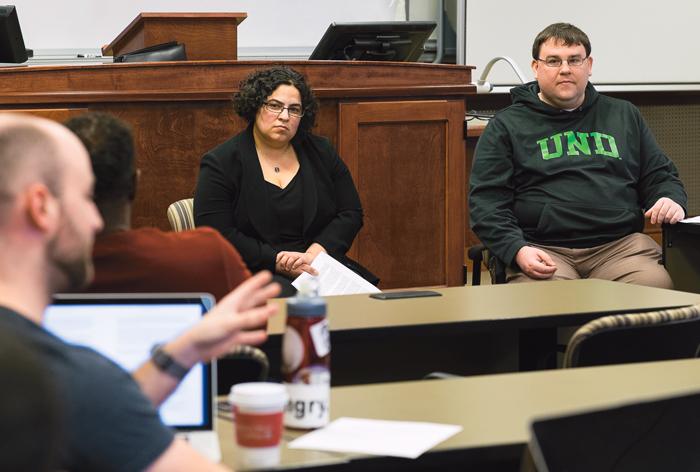(De)Constructing Race
Dakota Student / Nicholas Nelson
Lee Edward Brockington (front) speaks during the (de)constructing race discussion held last Friday at the School of Law.
February 24, 2017
On select Fridays during this semester, faculty and students of the UND law program will host in a series of discussions regarding race and racial injustice through both legal and social viewpoints.
As described in the university event calendar, “the goals of the series are to create space for conversations about meaningful difference, to examine and better appreciate how individuals experience the law and its effects, and to… critically engage as legal professionals with structures and hierarchies perpetuated by law.”
The group is organized and conducted by Sabrina Balgamwalla and Grant Christensen, both faculty members at the UND school of law. The professors mediate and guide the discussion in a way that stimulates ideas and thoughtful contribution.
The meetings are called “(De)Constructing Race, Difference and the Practice of Law.” They have a set of general rules to ensure that conversation is constructive. Those who speak up should speak from their own experience, not from the experiences of others. They will not demean or put down people for their experiences, or lack thereof.
They will practice non-judgement and keep contributions reasonably brief so that everyone who wishes to speak may do so. Finally, the objective is not to come to an agreement but a deeper understanding.
For each session, one or two short readings are selected which will be the topic of conversation. On Friday, Feb. 17, the group went over an excerpt from a work entitled “Whiteness As Property” by Cheryl Harris.
In her writing, Harris elaborated on the inherent privileges associated with being white versus non-white not only legally, but also socially and professionally. She raised the idea that one’s race, specifically caucasian, is an intangible “property” that gives one group of people advantages over others.
The group pondered whether there was value, even in today’s society, in being white as opposed to another race. One individual explained that it’s challenging for someone to recognize and acknowledge their own privilege when the life they live is all they’ve known. Few people have the empathy required to understand the different ways people are treated, the individual maintained.
The responses given by the people present were interesting and impressive. Though it wasn’t a large group of people, there was a great deal of insight and deep connections made that honestly made me think about my life and the lives of others in a way I hadn’t before.
One thing that struck me from the reading was a concept called “passing.” Harris tells a story about her grandmother in the 1930s working for a retail outlet in Chicago’s business district. As a black woman in 1930s America, this was unheard of. However, since the woman has straight hair, fair skin and other “white features,” she was able to “pass” as a white woman.
What’s interesting is that even though the country is no longer so blatant in it’s discrimination, the practice of “passing” still exists at some level. Has there ever been a time when you had to change your actions or appearance in order to be accepted?
“Whiteness As Property” by Cheryl Harris is only one of the readings discussed by the group. At every meeting, a new piece will be examined that explores a new facet of unjust legal and social institutions throughout history as well as in today’s world.
These sessions are not for a class or credit, they are simply aimed at starting a conversation that would not normally be had and to gain a deeper understanding.
If you wish to be a part of any of the remaining sessions, you do not have to be a law student. Even though the material is viewed through a legal scope, the sessions are open to all who wish to listen and engage respectfully in the topics and the experiences of others.
More information can be found on UND’s event calendar.
Ben Godfrey is a staff writer for The Dakota Student. He can be reached at benjamin.godfrey@und.edu



